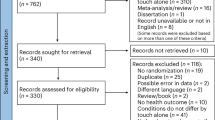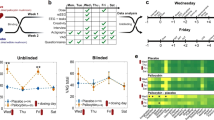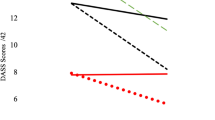Abstract
Objective
To determine the relationship between dietary patterns identified by reduced-rank regression method and psychological disorders in a large group of Iranian adults.
Methods
A cross-sectional study was performed on 3363 Iranian adults between 20 and 55 years. Dietary intakes were assessed using a validated dish-based semi-quantitative food frequency questionnaire. Psychological health was examined through validated Iranian version of Hospital Anxiety and Depression Scale and General Health Questionnaires. Reduced-rank regression was applied to identify dietary patterns based on the ratio of omega-3/omega-6, zinc, magnesium, vitamin B6, and folic acid intake. Logistic regression was used to assess the relationship between dietary patterns and psychological disorders.
Results
Three major dietary patterns were derived: “healthy,” “fish and poultry,” and “transitional.” After adjustment for potential confounders, “healthy” was associated with reduced depression (odds ratio (OR) for the highest vs. lowest quintile: 0.35; 95% confidence interval (CI): 0.25–0.50), anxiety (OR: 0.47; CI: 0.30–0.74), and psychological distress (OR: 0.52; CI: 0.36–0.75). Greater adherence to the “fish and poultry” was related with lower odds of depression (OR: 0.64; CI: 0.47–0.87). Participant in the third quintile of “fish and poultry” dietary pattern were less likely to be anxious (OR: 0.61; CI: 0.41–0.91). Additionally, we found an inverse significant correlation between adherence to the “transitional” dietary pattern and odds of depression (OR: 0.36; CI: 0.21–0.62), anxiety (OR: 0.43; CI: 0.21–0.88), and psychological distress (OR: 0.41; CI: 0.23–0.72).
Conclusion
We found that “healthy,” “fish and poultry,” and “transitional” dietary patterns have inverse significant relationship with odds of psychological disorders, but prospective studies are needed for causal conclusion.
This is a preview of subscription content, access via your institution
Access options
Subscribe to this journal
Receive 12 print issues and online access
$259.00 per year
only $21.58 per issue
Buy this article
- Purchase on Springer Link
- Instant access to full article PDF
Prices may be subject to local taxes which are calculated during checkout
Similar content being viewed by others
References
Walt G. WHO’s World health report 2003. BMJ. 2004;328:6.
Kessler RC, Berglund P, Demler O, Jin R, Merikangas KR, Walters EE. Lifetime prevalence and age-of-onset distributions of DSM-IV disorders in the National Comorbidity Survey Replication. Arch Gen Psychiatry. 2005;62:593.
Vasegh S, Mohammadi M-R. Religiosity, anxiety, and depression among a sample of Iranian medical students. Int J Psychiatry Med. 2007;37:213–27.
Murakami K, Miyake Y, Sasaki S, Tanaka K, Arakawa M. Dietary folate, riboflavin, vitamin B-6, and vitamin B-12 and depressive symptoms in early adolescence: the Ryukyus Child Health Study. Psychosom Med. 2010;72:763–8.
Kamphuis M, Geerlings M, Grobbee D, Kromhout D. Dietary intake of B6-9-12 vitamins, serum homocysteine levels and their association with depressive symptoms: the Zutphen Elderly Study. Eur J Clin Nutr. 2007;62:939–45.
Sánchez-Villegas A, Verberne L, De Irala J, Ruíz-Canela M, Toledo E, Serra-Majem L, et al. Dietary fat intake and the risk of depression: the SUN Project. PLoS ONE. 2011;6:e16268.
Appleton KM, Hayward RC, Gunnell D, Peters TJ, Rogers PJ, Kessler D, et al. Effects of n–3 long-chain polyunsaturated fatty acids on depressed mood: systematic review of published trials. Am J Clin Nutr. 2006;84:1308–16.
Amani R, Saeidi S, Nazari Z, Nematpour S. Correlation between dietary zinc intakes and its serum levels with depression scales in young female students. Biol Trace Elem Res. 2010;137:150–8.
Hibbeln JR. Fish consumption and major depression. Lancet. 1998;351:1213.
Fulkerson JA, Sherwood NE, Perry CL, Neumark-Sztainer D, Story M. Depressive symptoms and adolescent eating and health behaviors: a multifaceted view in a population-based sample. Prev Med. 2004;38:865–75.
Woo J, Lynn H, Lau WY, Leung J, Lau E, Wong SYS, et al. Nutrient intake and psychological health in an elderly Chinese population. Int J Geriatr Psychiatry. 2006;21:1036–43.
Miyake Y, Sasaki S, Yokoyama T, Tanaka K, Ohya Y, Fukushima W, et al. Risk of postpartum depression in relation to dietary fish and fat intake in Japan: the Osaka Maternal and Child Health Study. Psychol Med. 2006;36:1727–35.
Jacka FN, Pasco JA, Mykletun A, Williams LJ, Hodge AM, O’Reilly SL, et al. Association of Western and traditional diets with depression and anxiety in women. Am J Psychiatry. 2010;167:305–11.
Hu FB. Dietary pattern analysis: a new direction in nutritional epidemiology. Curr Opin Lipidol. 2002;13:3–9.
Akbaraly TN, Brunner EJ, Ferrie JE, Marmot MG, Kivimaki M, Singh-Manoux A. Dietary pattern and depressive symptoms in middle age. Br J Psychiatry. 2009;195:408–13.
Lai JS, Hiles S, Bisquera A, Hure AJ, McEvoy M, Attia J. A systematic review and meta-analysis of dietary patterns and depression in community-dwelling adults. Am J Clin Nutr. 2013;99:181–97.
Hoffmann K, Schulze MB, Schienkiewitz A, Nöthlings U, Boeing H. Application of a new statistical method to derive dietary patterns in nutritional epidemiology. Am J Epidemiol. 2004;159:935–44.
Nettleton JA, Steffen LM, Schulze MB, Jenny NS, Barr RG, Bertoni AG, et al. Associations between markers of subclinical atherosclerosis and dietary patterns derived by principal components analysis and reduced rank regression in the Multi-Ethnic Study of Atherosclerosis (MESA). Am J Clin Nutr. 2007;85:1615–25.
Hosseinzadeh M, Vafa M, Esmaillzadeh A, Feizi A, Majdzadeh R, Afshar H, et al. Empirically derived dietary patterns in relation to psychological disorders. Public Health Nutr. 2016;19:204–17.
Samieri C, Jutand MA, Féart C, Capuron L, Letenneur L, Barberger-Gateau P. Dietary patterns derived by hybrid clustering method in older people: association with cognition, mood, and self-rated health. J Am Diet Assoc. 2008;108:1461–71.
Carrera PM, Gao X, Tucker KL. A study of dietary patterns in the Mexican-American population and their association with obesity. J Am Diet Assoc. 2007;107:1735–42.
Samieri C, Jutand MA, Feart C, Capuron L, Letenneur L, Barberger-Gateau P. Dietary patterns derived by hybrid clustering method in older people: association with cognition, mood, and self-rated health. JAMA. 2008;66:1090–8.
Schulze MB, Hoffmann K, Manson JAE, Willett WC, Meigs JB, Weikert C, et al. Dietary pattern, inflammation, and incidence of type 2 diabetes in women. Am J Clin Nutr. 2005;82:675–84.
Melaku YA, Gill TK, Taylor AW, Adams R, Shi Z. A comparison of principal component analysis, partial least-squares and reduced-rank regressions in the identification of dietary patterns associated with bone mass in ageing Australians. Eur J Nutr. 2017;57:1969–83.
Oddy WH, Robinson M, Ambrosini GL, de Klerk NH, Beilin LJ, Silburn SR, et al. The association between dietary patterns and mental health in early adolescence. Prev Med. 2009;49:39–44.
Jacka FN, Mykletun A, Berk M, Bjelland I, Tell GS. The association between habitual diet quality and the common mental disorders in community-dwelling adults: the Hordaland Health study. Psychosom Med. 2011;73:483–90.
Musaiger AO. Diet and prevention of coronary heart disease in the Arab Middle East countries. Med Princ Pract. 2002;11 Suppl 2:9–16.
Eloul L, Ambusaidi A, Al-Adawi S. Silent epidemic of depression in women in the Middle East and North Africa region: emerging tribulation or fallacy? Sultan Qaboos Univ Med J. 2009;9:5.
Ferrari A, Somerville A, Baxter A, Norman R, Patten S, Vos T, et al. Global variation in the prevalence and incidence of major depressive disorder: a systematic review of the epidemiological literature. Psychol Med. 2013;43:471–81.
Adibi P, Keshteli AH, Esmaillzadeh A, Afshar H, Roohafza H, Bagherian-Sararoudi H. et al. The study on the epidemiology of psychological, alimentary health and nutrition (SEPAHAN): overview of methodology. J Res Med Sci. 2012;17:1–7.
Keshteli AH, Esmaillzadeh A, Rajaie S, Askari G, Feinle-Bisset C, Adibi P. A dish-based semi-quantitative food frequency questionnaire for assessment of dietary intakes in epidemiologic studies in Iran: design and development. Int J Prev Med. 2014;5:29.
Calon F. Omega-3 polyunsaturated fatty acids in Alzheimers disease: key questions and partial answers. Curr Alzheimer Res. 2011;8:470–8.
Montazeri A, Vahdaninia M, Ebrahimi M, Jarvandi S. The Hospital Anxiety and Depression Scale (HADS): translation and validation study of the Iranian version. Health Qual Life Outcomes. 2003;1:14.
Montazeri A, Harirchi AM, Shariati M, Garmaroudi G, Ebadi M, Fateh A. The 12-item General Health Questionnaire (GHQ-12): translation and validation study of the Iranian version. Health Qual Life Outcomes. 2003;1:66.
Nanri A, Kimura Y, Matsushita Y, Ohta M, Sato M, Mishima N, et al. Dietary patterns and depressive symptoms among Japanese men and women. Eur J Clin Nutr. 2010;64:832–9.
Lai JS, Hiles S, Bisquera A, Hure AJ, McEvoy M, Attia J. A systematic review and meta-analysis of dietary patterns and depression in community-dwelling adults. Am J Clin Nutr. 2013;99:181–97.
Kräuchi K, Wirz-Justice A. The four seasons: food intake frequency in seasonal affective disorder in the course of a year. Psychiatry Res. 1988;25:323–38.
Meyer KA, Kushi LH, Jacobs DR, Slavin J, Sellers TA, Folsom AR. Carbohydrates, dietary fiber, and incident type 2 diabetes in older women. Am J Clin Nutr. 2000;71:921–30.
Lucas M, Chocano-Bedoya P, Shulze MB, Mirzaei F, O’Reilly ÉJ, Okereke OI. et al. Inflammatory dietary pattern and risk of depression among women. Brain Behav Immun. 2014;36:46–53.
Wurtman RJ, Wurtman JJ. Brain serotonin, carbohydrate‐craving, obesity and depression. Obes Res. 1995;3 Suppl 4:477S–80S.
Gilbody S, Lightfoot T, Sheldon T. Is low folate a risk factor for depression? A meta-analysis and exploration of heterogeneity. J Epidemiol Community Health. 2007;61:631–7.
Tolmunen T, Hintikka J, Ruusunen A, Voutilainen S, Tanskanen A, Valkonen V-P, et al. Dietary folate and the risk of depression in Finnish middle-aged men. Psychother Psychosom. 2004;73:334–9.
Jacka FN, Overland S, Stewart R, Tell GS, Bjelland I, Mykletun A. Association between magnesium intake and depression and anxiety in community-dwelling adults: the Hordaland Health Study. Aust NZ J Psychiatry. 2009;43:45–52.
Murakami K, Sasaki S. Dietary intake and depressive symptoms: a systematic review of observational studies. Mol Nutr Food Res. 2009;54:471–88.
Noguchi R, HIRAOkA M, Watanabe Y, Kagawa Y. Relationship between dietary patterns and depressive symptoms: difference by gender, and unipolar and bipolar depression. J Nutr Sci Vitaminol (Tokyo). 2013;59:115–22.
Timonen M, Horrobin D, Jokelainen J, Laitinen J, Herva A, Räsänen P. Fish consumption and depression: the Northern Finland 1966 birth cohort study. J Affect Disord. 2004;82:447–52.
Parker G, Gibson N, Brotchie H, Heruc G, Rees A-M, Hadzi-Pavlovic D. Omega-3 fatty acids and mood disorders. Am J Psychiatry. 2006;163:969–78.
Hakkarainen R, Partonen T, Haukka J, Virtamo J, Albanes D, Lönnqvist J. Is low dietary intake of omega-3 fatty acids associated with depression? Am J Psychiatry. 2004;161:567–9.
Torres SJ, Nowson CA. A moderate-sodium DASH-type diet improves mood in postmenopausal women. Nutrition. 2012;28:896–900.
Meyer BJ, Kolanu N, Griffiths DA, Grounds B, Howe PR, Kreis IA. Food groups and fatty acids associated with self-reported depression: an analysis from the Australian National Nutrition and Health Surveys. Nutrition. 2013;29:1042–7.
Weng TT, Hao JH, Qian QW, Cao H, Fu JL, Sun Y, et al. Is there any relationship between dietary patterns and depression and anxiety in Chinese adolescents? Public Health Nutr. 2012;15:673–82.
Funding
The study was financially supported by Deputy for Research, Isfahan University of Medical Sciences, Iran.
Author information
Authors and Affiliations
Corresponding author
Ethics declarations
Conflict of interest
The authors declare that they have no conflict of interest.
Additional information
Publisher’s note: Springer Nature remains neutral with regard to jurisdictional claims in published maps and institutional affiliations.
Supplementary information
Rights and permissions
About this article
Cite this article
Hosseinzadeh, M., Vafa, MR., Esmaillzadeh, A. et al. Psychological disorders and dietary patterns by reduced-rank regression. Eur J Clin Nutr 73, 408–415 (2019). https://doi.org/10.1038/s41430-019-0399-8
Received:
Revised:
Accepted:
Published:
Issue Date:
DOI: https://doi.org/10.1038/s41430-019-0399-8
This article is cited by
-
Dietary intake of branched-chain amino acids in relation to depression, anxiety and psychological distress
Nutrition Journal (2021)
-
Dietary patterns related to zinc and polyunsaturated fatty acids intake are associated with serum linoleic/dihomo-γ-linolenic ratio in NHANES males and females
Scientific Reports (2021)
-
In vitro evaluation of the anticancer activity of barbituric/thiobarbituric acid-based chromene derivatives
Molecular Biology Reports (2021)
-
Comparing two methods for deriving dietary patterns associated with risk of metabolic syndrome among middle-aged and elderly Taiwanese adults with impaired kidney function
BMC Medical Research Methodology (2020)



